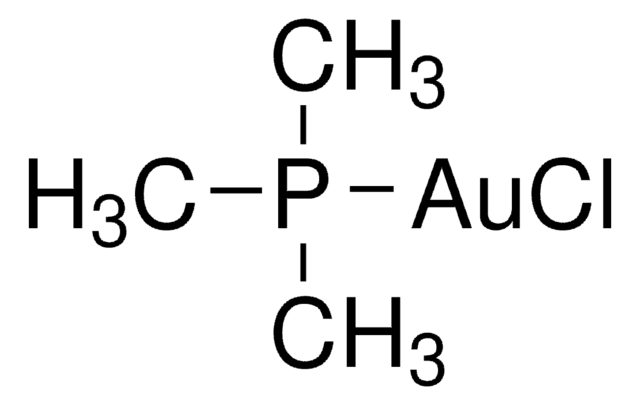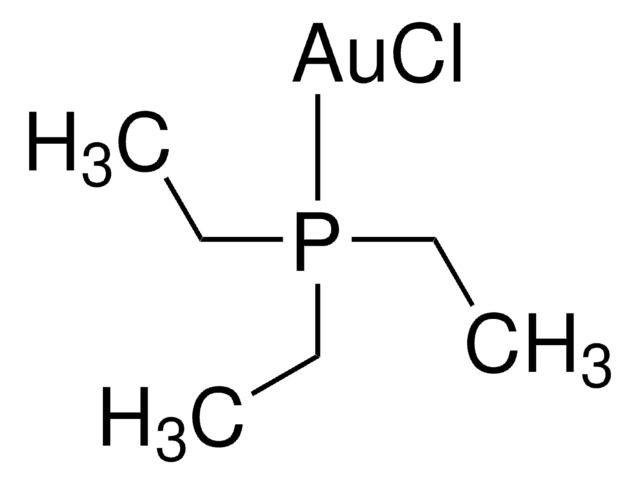481130
Gold(I) chloride
99.9% trace metals basis
Synonym(s):
Aurous chloride, Gold monochloride
About This Item
Recommended Products
Quality Level
assay
99.9% trace metals basis
form
powder
reaction suitability
reagent type: catalyst
core: gold
impurities
≤1500 ppm Trace Metal Analysis
mp
289 °C (dec.) (lit.)
density
7.57 g/mL at 25 °C (lit.)
SMILES string
[Cl-].[Au+]
InChI
1S/Au.ClH/h;1H/q+1;/p-1
InChI key
FDWREHZXQUYJFJ-UHFFFAOYSA-M
Looking for similar products? Visit Product Comparison Guide
General description
Application
- As a precursor to prepare magnetic nanocatalyst systems for various organic transformations. For example, Fe3O4@SiO2-P–AuCl can be used as a catalyst for one-pot reductive amination of aldehydes and ketones with various aromatic amines.
- As a starting material to synthesize Au-containing complexes for application in the field of drug delivery, solar cells, sensors, and organic synthesis.
- As a precatalyst for stereoselective cycloisomerization of α-thioallenes to 2,5-dihydrothiophenes via C-S bond formation.
- As a catalyst for the conversion of siloxy cyclohexadienes, to the corresponding1,2- and 1,3-cyclohexenones via Gold-Catalyzed Cycloisomerization.
signalword
Danger
hcodes
Hazard Classifications
Skin Corr. 1B - Skin Sens. 1
Storage Class
8A - Combustible corrosive hazardous materials
wgk_germany
WGK 3
flash_point_f
Not applicable
flash_point_c
Not applicable
ppe
Eyeshields, Faceshields, Gloves, type P3 (EN 143) respirator cartridges
Choose from one of the most recent versions:
Certificates of Analysis (COA)
Don't see the Right Version?
If you require a particular version, you can look up a specific certificate by the Lot or Batch number.
Already Own This Product?
Find documentation for the products that you have recently purchased in the Document Library.
Customers Also Viewed
Articles
Access gold precatalysts, silver salts, and unsaturated building blocks to accelerate research success in catalysis applications.
Plasmonic nanoparticles have unique optical properties that can be tailored to suit a variety of applications in the biotechnology1–8 and electronics9–16 industries.
Our team of scientists has experience in all areas of research including Life Science, Material Science, Chemical Synthesis, Chromatography, Analytical and many others.
Contact Technical Service









![[(IPr)AuCl] Umicore](/deepweb/assets/sigmaaldrich/product/structures/186/572/1f89dfca-fb52-46a2-9c9d-96db67c22883/640/1f89dfca-fb52-46a2-9c9d-96db67c22883.png)
